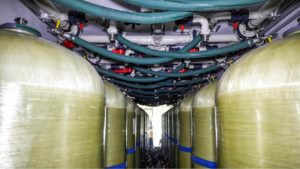Problem
Before the commissioning of a Mid-western natural gas and steam-driven power plant, tests on the plant’s source water revealed elevated levels of carbon dioxide (CO2). With no plans for an on-site water-treatment facility, the plant relied on MPW as its exclusive deionization (DI) supplier. The facility is also a zero-liquid-discharge (ZLD) site, reusing its water due to the costs associated with municipal usage at its rural location.
Site managers knew the plant would be required to supply a significant amount of power to the grid, so it would need to be operational for most of the year. Although MPW’s DI units purified up to 500,000 gallons of water prior to exhaustion, plant personnel requested longer-duration throughputs that would minimize the frequency of trailer swaps.
Solution
MPW and plant personnel determined that the CO2 level of the feedwater was approximately 25 parts per million (ppm). CO2, which enters the source water from the air or from processes within the plant, negatively impacts DI throughputs. The recycling of the water was also a complicating factor in the ZLD process, as it led to an increase in contaminants, further deterring the efficiency of DI trailers.
MPW’s solution: design, build and install a permanent CO2-removal membrane system. MPW also provided all service and maintenance in what it refers to as a Build-Own-Operate-Maintain (BOOM) Water System. BOOMs are an alternative to in-house water-treatment systems, allowing customers to focus on fundamental operations. Each system is custom designed to accommodate virtually any water quality, flow rate, space restrictions or effluent requirements. BOOM systems also include Programmable Logic Controllers, allowing for remote monitoring and trending of system performance.
Results
The BOOM System reduced CO2 levels to the 2 to 4 ppm range, effectively increasing throughputs more than 30 percent and saving the plant more than $100,000 annually. Additionally, MPW has worked with plant personnel to solve water-chemistry issues without damaging the performance of the DI or BOOM systems.
MPW has reported zero safety incidents at this site and plant personnel consistently praise MPW’s professional service and prompt response.
